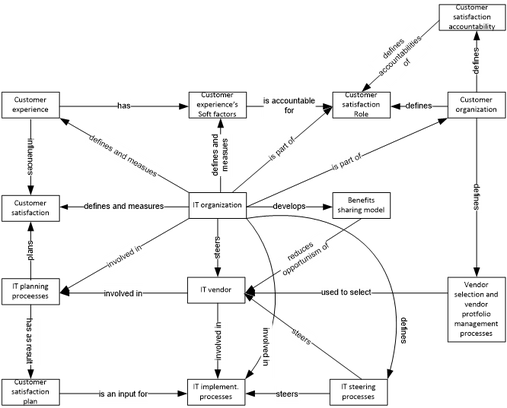|
IT vendor management (ITVM) plays an increasingly relevant role for IT organizations. External vendors play a key role in relation to IT organizations; many companies already spend more than half their IT budgets on products and services from external vendors and are looking to raise the IT budget amount dedicated to external IT procurement. Despite the abundant prescriptive literature on ITVM, studies reveal that companies are often dissatisfied with the deliverables supplied by external IT vendors. The problem of low satisfaction with procured IT products and services is gaining relevance for IT organizations owing to the increased involvement of vendors in the modern IT value chain; increasingly, vendors and their staff are in direct contact with both internal IT personnel and business users. However, despite the importance of a high IT customer satisfaction level for IT organizations, the ITVM literature focuses mainly on enhancing the quality of deliverables and makes no recommendations on how to directly enhance customer satisfaction. To address the problem of dissatisfaction with IT products and services delivered by external vendors, we investigated current ITVM practices and identify improvement areas for these practices in a recent research project. Since there are abundant prescriptions on how to design ITVM in the IS literature, we provide detailed recommendations on how to extend current ITVM practices so as to enhance customer satisfaction. We followed the design science paradigm in information systems (IS) research, which is a problem-solving and prescription-driven paradigm that seeks to create new things that serve human purposes and provide solutions to management problems. Our goal was to extend the ITVM literature by developing a design theory for customer satisfaction-oriented ITVM. Specifically, we aim to (1) derive a generalized set of metarequirements (i.e. generalized requirements) on the ITVM practices to be developed to enhance customer satisfaction, (2) to explain why these metarequirements are met by a generalized set of ITVM design principles (DP) (i.e. generalized design prescriptions), and (3) to deliver blueprints for the implementation of DPs. To answer our research question, we conducted an action research study at a large professional service company. Constructs of the Design Theory
In a recent publication, we theoretically explain and present preliminary empirical evidence of why the implementation of a particular DP is expected to lead to higher customer satisfaction. Our findings indicate that establishing benefits sharing and incentive models for IT vendors, as well as defining and steering customer experience, are the chief management practices that promise improved IT customer satisfaction. Our work’s contribution is twofold: First, we present a generalized design theory for implementing customer satisfaction-oriented ITVM. Second, we develop a basic theoretical understanding of which DPs are needed to enhance customer satisfaction and of how these DPs contribute to reaching this goal. Formulating such DPs can be a first step towards a more general prescriptive research in the field of ITVM, which is dominated by studies on IT outsourcing management and governance. Our research results have immediate practical implications. After having exploited the potential of detailed contracts and strict enforcement of governance guidelines, our research suggests that companies can only reach the next level of ITVM by addressing the “soft” factors that influence customer satisfaction, and by establishing a trustful work atmosphere with IT vendors. In addition, explaining a DP’s MRs is essential for organizations seeking to implement ITVM. This explanation allows companies to better judge whether a certain practice can lead to significant ITVM improvement in a particular organizational setting and to better measure the impact of an ITVM practice. The research results have recently been accepted for publication: Urbach, N., Ahlemann, F. and El Arbi, F. (2014): Towards a Design Theory for Customer Satisfaction-Oriented IT Vendor Management, Proceedings of the 20th Americas Conference on Information Systems (AMCIS 2014), August 7-10, Savannah, Georgia. (Link)
1 Comment
|
Archives
December 2015
Categories
All
|

 RSS Feed
RSS Feed